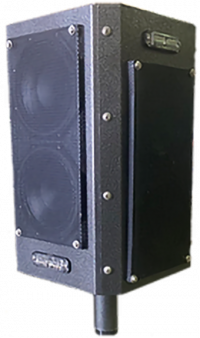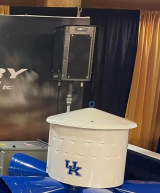SV-8: Difference between revisions
(Creating page for new siren model. Needing to be expanded later.) |
No edit summary |
||
| (7 intermediate revisions by 2 users not shown) | |||
| Line 1: | Line 1: | ||
{{Infobox siren | {{Infobox siren|title=Sentry SV-8|image=Sentry_SV8.png|company=[[Sentry Siren, Inc.]]|produced=2023-Present|type=[[Directional]] [[Electronic]]|output=110-116 dB (claimed)|wattage=4000 W|preceded=[[Sentry VR]]|voltage=120|current=AC/DC|sheet=https://www.sentrysiren.com/_files/ugd/15083f_f6c9060529284c58aac9984457179a9c.pdf}}The '''Model''' '''SV''' is a line of electronic siren produced by [[Sentry Siren]] and is Sentry's 2nd attempt to enter the electronic siren market. The Model SV-8 was leaked by C and K Early Warning Systems in April 2022, with little information being released about it until the siren was released in February 2023. It is intended to replace the short-lived [[Sentry VR|Model VR]], which was Sentry's 1st foray into electronic sirens. The Model SV-8, like its predecessor, is designed for campus and public notification use, and competes with the ASC [[ASC Clarity|Clarity]] and similar small electronic sirens. | ||
|image = | |||
|company = [[Sentry Siren | |||
|produced = 2023-Present | |||
|type = [[Electronic]] | |||
|output = 110- | |||
|preceded | |||
| | |||
|sheet=https://www.sentrysiren.com/_files/ugd/15083f_f6c9060529284c58aac9984457179a9c.pdf | |||
}} | |||
== Design == | |||
== | === SV-8 === | ||
[[File:SV-8 2.png|left|thumb|193x193px|A Model SV-8 unit being advertised by Sentry. A Model 14V can be seen in the foreground.]] | |||
The Model SV-8 is a small electronic siren that is designed as a "Giant Voice" system, prioritizing voice clarity over raw sound output. The siren is rated by Sentry with an 0.85 - 0.95 Sound Transmission Index (STI) rating. This is slightly less than the aforementioned Sentry VR, but still higher than the siren's competition such as the [[Federal Signal Modulator|Modulator II]], [[Acoustic Technology, Inc.|HPSS]] or [[Whelen WPS-2900|WPS-2900]]. The Model SV-8 uses 8 500 W Neodymium hi-fi speaker drivers running on a 4000 W amplifier, and like the Sentry VR, it uses cone speakers instead of horns to project the sound. While this allows for better voice clarity, it requires a higher voltage to get the same raw sound output as an electronic siren with horns. The Model SV-8 runs standard on 120 V AC, with the option for AC/DC operation on solar panels or battery backup also being available. | |||
Each Model SV-8 unit has 2 B&C Pro Sound speakers on each side, which are staggered in height. The siren comes standard with 4 Class I high intensity LED strobe lights, one on each side. On two sides, the strobe is above the speakers, while on the other two sides the strobe is located below. The Model SV-8 is rated between 110-116 dB at 100 ft, which is rather low for the wattage the siren uses. It is likely that this siren is intended for campus use rather than as a standard public warning siren, due to its prioritization of voice clarity over sound output and overall lack of raw performance. As of February 2023, no Model SV-8 units are known to have been installed, although the siren finally appeared on Sentry's website the same month, nearly a year after its original leak. A few units are known to exist as demonstrators, operated by Sentry themselves. | |||
[[Category:Sentry Siren Incorporated]] | |||
[[Category:Electronic Sirens]] | |||
[[Category:Omnidirectional Sirens]] | |||
[[Category:Single Toned Sirens]] | |||
[[Category:Dual Toned Sirens]] | |||
__INDEX__ | |||
[[Category:Sirens]] | |||
[[Category:Sentry Siren Incorporated]][[Category:Electronic Sirens]][[Category:Omnidirectional Sirens]][[Category:Sirens]][[Category: | |||
Latest revision as of 17:59, 24 November 2024
| Sentry SV-8 | |

| |
| Company | Sentry Siren, Inc. |
|---|---|
| Produced | 2023-Present |
| Type | Directional Electronic |
| Sound output | 110-116 dB (claimed) |
| Wattage | 4000 W |
| Voltage | 120 V AC/DC |
| Preceded by | Sentry VR |
| Documentation | Product sheet |
The Model SV is a line of electronic siren produced by Sentry Siren and is Sentry's 2nd attempt to enter the electronic siren market. The Model SV-8 was leaked by C and K Early Warning Systems in April 2022, with little information being released about it until the siren was released in February 2023. It is intended to replace the short-lived Model VR, which was Sentry's 1st foray into electronic sirens. The Model SV-8, like its predecessor, is designed for campus and public notification use, and competes with the ASC Clarity and similar small electronic sirens.
Design
SV-8

The Model SV-8 is a small electronic siren that is designed as a "Giant Voice" system, prioritizing voice clarity over raw sound output. The siren is rated by Sentry with an 0.85 - 0.95 Sound Transmission Index (STI) rating. This is slightly less than the aforementioned Sentry VR, but still higher than the siren's competition such as the Modulator II, HPSS or WPS-2900. The Model SV-8 uses 8 500 W Neodymium hi-fi speaker drivers running on a 4000 W amplifier, and like the Sentry VR, it uses cone speakers instead of horns to project the sound. While this allows for better voice clarity, it requires a higher voltage to get the same raw sound output as an electronic siren with horns. The Model SV-8 runs standard on 120 V AC, with the option for AC/DC operation on solar panels or battery backup also being available.
Each Model SV-8 unit has 2 B&C Pro Sound speakers on each side, which are staggered in height. The siren comes standard with 4 Class I high intensity LED strobe lights, one on each side. On two sides, the strobe is above the speakers, while on the other two sides the strobe is located below. The Model SV-8 is rated between 110-116 dB at 100 ft, which is rather low for the wattage the siren uses. It is likely that this siren is intended for campus use rather than as a standard public warning siren, due to its prioritization of voice clarity over sound output and overall lack of raw performance. As of February 2023, no Model SV-8 units are known to have been installed, although the siren finally appeared on Sentry's website the same month, nearly a year after its original leak. A few units are known to exist as demonstrators, operated by Sentry themselves.